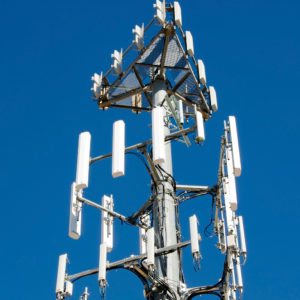Cell phone service in the Granite State is hit or miss, at best. And it’s not clear when it will get better with a state commission recently trying to slow down the expansion of faster service.
As the rest of the county is seeing the rollout of improved service in the form of faster 5G signals, New Hampshire seems to be trying to slow down the technology. The state’s 5G Commission issued a report calling for a slowed-down expansion, citing health concerns. This despite federal agencies deeming the technology safe.
David Juvet, with the New Hampshire Business and Industry Association, said the main problem with New Hampshire’s cell service is the fact that it is a rural state.
“A large part of the state is rural, and there’s often resistance to putting up cell phone towers in parts of the state that are rural, or connected to a state or national park,” Juvet said.
Rural or not, the lack of dependable cell service is holding back parts of the state. Jeffrey Hastings, with the Lakes Region Planning Commission, has complained to the New Hampshire Public Utilities Commission (PUC) about the poor service in the Lake Region, saying it is a safety hazard and an economy-killer.
“Poor quality or non-existent telecommunications services are jeopardizing the health and safety of our residents and are constraining economic development in New Hampshire’s Lakes Region,” Hastings said in a letter to the PUC.
The PUC does not regulate cell phone service in New Hampshire, and there is no state regulation of the internet. The telecommunications industry was deregulated back in the days of landlines in the Granite State.
The cell phone carriers operating in New Hampshire may not be telling the truth about their capabilities, according to the Federal Communications Commission. It recently investigated cell one coverage maps and found companies regularly overstate service capabilities. The investigation looked at six states, with Vermont being one of them. During the Vermont investigations, FCC field agents also traveled into New Hampshire and Massachusetts, and found the service seriously lacking.
“Through the investigation, staff discovered that the MF-II coverage maps submitted by Verizon, U.S. Cellular, and T-Mobile likely overstated each provider’s actual coverage and did not reflect on-the-ground performance in many instances,” the FCC report states. “Only 62.3 percent of staff drive tests achieved at least the minimum download speed predicted by the coverage maps—with U.S. Cellular achieving that speed in only 45 percent of such tests, T-Mobile in 63.2 percent of tests, and Verizon in 64.3 percent of tests.”
Juvet said there is a federal initiative to increase the cell service capabilities, but it is not clear how that’s helping New Hampshire yet. The 5G rollout is supposed to offer faster wireless internet download speeds, but Juvet said that would not solve all of the problems.
“5G is an improvement, but it’s not going to be a silver bullet,” he said.
5G signals can deliver up to 20 gigabits per second of data using small radio towers and can be placed on lampposts or other low, hanging objects.
Juvet has been critical of the 5G Commission report, citing claims that 5G radio frequencies will damage human DNA.
The commission issued a minority report from members critical of the process, saying the full commission ignored testimony from experts that 5G is safe.
“The consensus of the U.S. and international scientific community is that there are no known adverse health risks from the levels of RF energy emitted at the frequencies used by wireless devices (including cellphones) and facilities (including small cells). Some of those who presented to the NH 5G Commission have sought to sow confusion, but the facts demonstrate otherwise,” the minority report states.
The 5G Commission report was used by the city of Keene to also slow down the expansion of 5G there, though several applications for 5G service providers have been presented to city hall. Whatever happens with 5G, New Hampshire needs a better communications system, said state Sen. Jeb Bradley, R-Wolfeboro.
“We’re increasingly needing the ability to communicate from wherever we are,” he said.
Bradley is pushing for SB85, a bill to expand broadband internet access to rural parts of the state using a matching grant program to fund the coverage gaps. During the pandemic, New Hampshire residents have moved to telehealth appointments, remote learning for students, and work from home.
“It’s become increasingly clear that people in their everyday lives need good internet access to function,” he said.
Bradley isn’t sure what to make of the 5G Commission report.
“Some people have cited health risks of 5G. I know people have raised issues, but the technology is pretty impressive, too,” he said.



